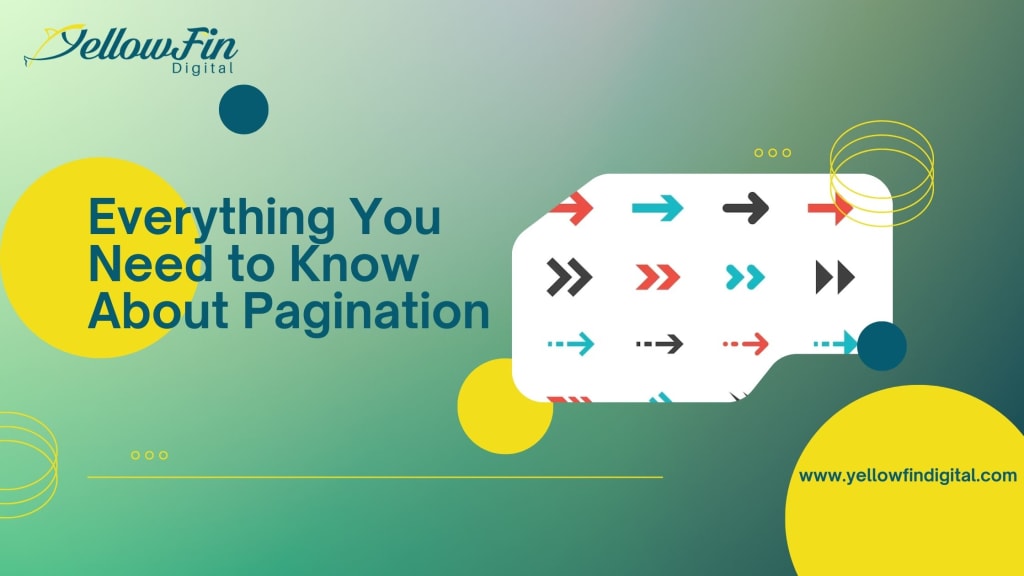Everything You Need to Know About Pagination
Pagination is a great way to break down large pieces of content into more manageable subsections. See how to easily add pagination to your website and learn its benefits for SEO and web design.

When it comes to creating a successful website, content is key - but organization is just as important. And for e-commerce sites with a lot of information to share, organizing content can be a real challenge. Thankfully, professional web developers have a range of techniques to make the user experience smoother and keep visitors engaged. One of those techniques is called pagination. This blog will provide a comprehensive overview of pagination and highlight how professional web development services are essential for successful website deployment.
What is Pagination?
Pagination is a process that divides digital materials into discrete pages, along with the automated addition of consecutive numbers to designate the order in which these sections appear. This applies both to print documents and some online material alike. It is commonly used to organize and display a large amount of content in an organized way.
What is Pagination in Web Development?
Pagination is linking a series of related pages and splitting content on one page into different sections. Google, among many other search engines, uses pagination to help visitors find what they're looking for without scrolling through unending web pages. This makes it easier for your viewers and can improve SEO rankings in the long run.
What is Pagination in SEO?
With the convenience of this user-friendly feature, users can browse through page after page with simple clicks on "next" and "previous." Page numbers are also available for fast navigation between pages that display one result per page.
Google provides some valuable advice regarding the most effective methods for pagination implementation:
- Link pages in order
- Use URLs properly
- Do not index URLs using filters or alternative sorting methods
Importance of Pagination for Website
Implementing pagination is an integral part of web development, allowing you to keep numerous contents on your website without overcrowding a single page. Here are some persuasive reasons why it should be utilized by any website that contains massive amounts of data and multiple pages:
1. Better User Experience
Presenting too much data on one webpage can be overwhelming for users, but pagination is the solution to this problem. It enables website owners to organize their content in more digestible portions. Online shopping websites exemplify this concept; customers are drawn in by eye-catching product images and prices. A simple click on the image or call-to-action button provides access to more information.
This process further redirects users to the details they need for an informed buying decision. Pagination facilitates seamless user navigation while organizing sizable datasets in an orderly manner.
2. Easier Navigation for Users
By utilizing pagination, consumers can easily browse and navigate through the different offerings on a website. Furthermore, users will be able to access additional results after reaching the final page of the website; with pagination, they understand how many more pages there are and can jump directly from one-page number to another. Not only does this save time, but it also provides a much clearer picture of the size and complexity of a large dataset.
How Does Pagination Impact SEO?
There is no denying that pagination can lead to a much better user experience. But how does this affect your website's SEO? The answer is: significant. Enhanced UX will notably bolster the search engine optimization of your entire site.
Have you ever wondered how pagination can help improve the SEO of your website? Let's find out.
1. Ensure Better Crawling by Search Engine Bots
As your website grows and the number of pages increases, search engine crawlers must properly manage their "crawl budget" to crawl all parts of a website effectively. With proper resource allocation, some web pages may be visited or indexed. This can seriously affect SEO efficacy, so you utilize every tool to ensure that Google's bots see these valuable pages.
Not to mention, crawlers may need to pay attention to crucial pages beyond the first page of pagination. For example, Google's search engine is renowned for displaying the most relevant and important results on the first page.
Utilizing pagination allows you to place highly-important pages upfront and center when users visit your site or home page, where pagination begins after being integrated into your website. With this procedure, visitors can interact with various sections of your webpage as soon as they arrive.
2. Make Use of Small and Effective Contents
Generating and displaying content on a website takes effort and effort. Content may be too sparse, or there could be excessive information for search engines to deem your site worthy of display.
Pagination provides the ideal solution by allowing you to optimize the size of each page's content delivering an improved user experience while enabling higher ranking potential. Rather than overwhelming visitors with dense content, pagination invites them in with small chunks of easily digestible segments that still carry huge value.
3. Avoid Site and Content Duplications on Webpages
Operating an online store usually means your product pages have a similar format and data. Also, because so many other companies offer the same services as you, some of your website content can be duplicated elsewhere on the internet without you even being aware of it.
It is not unusual for websites to share related on-page SEO elements such as anchor texts, H1 tags, meta descriptions, CTAs, and page titles. Unfortunately, search engine bots may have difficulty seeing the distinction between sites with similar content representing different products; they could opt to crawl some pages while bypassing others or, worst case scenario, flag your website for duplicate content.
By strategically employing pagination on your website, you can make a visible impact on SEO. This approach is perfect for those seeking to create fresh content and arrange it efficiently, thereby avoiding duplication while maximizing the potential of various SEO methods. By using pagination thoughtfully, the potential gains are boundless.
4. Improved Website Ranking Signals
Pagination is vital for improving a user's experience; otherwise, visitors can be easily overwhelmed by websites with plenty of content. Moreover, it boosts website rankings since backlinks from authoritative sites will direct much-needed clout to your site. Nevertheless, you use pagination on your pages. In that case, the authority will be spread across multiple sections, which could make it appear "diluted" in comparison to a single page without any breakups.
Related Posts: Why My Website Not Showing Up on Google?
Effective SEO Practices for Pagination in Web Design
Have you ever encountered digital marketing and heard about Search Engine Optimization (SEO) techniques? If so, you know that SEO is a powerful strategy many websites employ to rank higher on different search engines. Discover how the full benefit of pagination can be realized in your SEO efforts.
1. Create Unique and Relevant Content
If you want to stand out from the competition and make sure Google notices your paginated pages, they must contain unique content relevant to users' searches. By curating customized material on all of your web pages, consumers can have a complete understanding of any item or service up for sale; this increases the chances of them purchasing it from you. In addition, with updated algorithms employed in Google searches, ensuring all facets within each page provide pertinent information will ensure maximum visibility.
2. Make Smart and Optimized Use of Keywords
To ensure the top pages are connected, sites must use keywords in their anchor text. Frequently paginated pages employ this anchor text to let Google discern that a page is related to its higher-level website link. Yet this could lead to keyword cannibalism, so circumventing it requires utilizing different iterations of the same keyword throughout your site's paginated pages; otherwise, they'll compete for attention.
3. Make Use of Parameter URLs
Search engines require an understanding of how to crawl web pages to be indexed properly. Luckily, parameter URLs come in handy when displaying the same content across multiple pages - Google can easily recognize each page's relation. This helpful tool will make your website more organized and relevant among search engine results.
4. Structure Your Link Properly
When dealing with paginated pages, it's important to remember that link equity cannot be shared between links. So to avoid muddying up ranking signals, ensure your backlinking strategy is simple - the number of links from a landing page to any relevant paginated pages should be kept as low as possible.
5. Choose a Proper Place for Pagination Numbers
Ensuring the best possible usability requires careful selection of pagination number placement. Poorly chosen locations may cause users to miss it entirely, so placing the function at both the top and bottom of long pages are suggested to allow for rapid access without needing excessive scrolling up and down.
6. Create Large Buttons with Space for Clicking
All too often, designers need to contemplate the size of pagination buttons. If these numbers are enlarged for mobile screens, users can avoid mistakenly landing on an unintended page; after all, billions rely upon their phones and tablets to access the internet. That is why people must ensure our pagination buttons are large enough to use a mobile device comfortably.
7. Make Sure to Give the Users a Way Back
Make sure to showcase the current page for all your website visitors so they understand their exact location on-site. Differentiate this feature from other numbers and buttons by emphasizing it through highlighting or styling it differently. To prevent any potential reloading not authorized by you, make sure that the figure/button is not linked in any way.
Conclusion
Pagination can be an excellent tool when utilized correctly. In web design, it is a powerful technology to improve user experience and SEO performance. With these seven tips, you can make your web content more efficient and effective. To further maximize the impact of web page pagination, consider partnering with experienced web development professionals in Corpus Christi. They can help you maximize web page pagination and provide valuable insight into web design best practices.
About the Creator
Elli Brice
Digital Marketer by Profession | Content Writer by Heart!






Comments
Elli Brice is not accepting comments at the moment
Want to show your support? Send them a one-off tip.